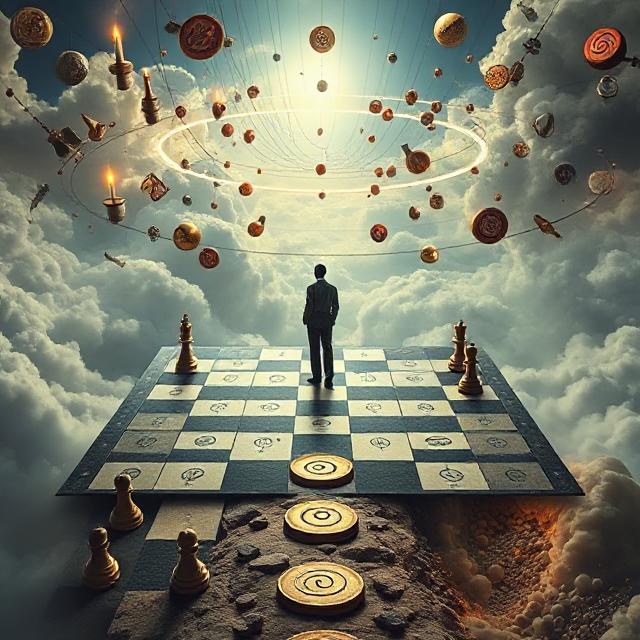Your cart is currently empty!
The Illusion of Control in Belief Systems

Table of Contents
The Illusion of Control in Belief Systems
The illusion of control in belief systems reveals how human beings often overestimate their ability to influence outcomes in a complex and unpredictable world. From ritualistic behaviors to deeply held religious convictions, many belief systems provide not only a sense of purpose—but also a comforting illusion that we are more in control than we actually are. But why do we need this illusion? And how does it shape the way we perceive the world?
This article explores the psychological, cognitive, and cultural roots of control illusions, examining how belief systems—religious, superstitious, political, or personal—fulfill our yearning for certainty and agency.
I. What Is the Illusion of Control?
Coined by psychologist Ellen Langer in 1975, the “illusion of control” refers to the tendency for people to believe they can influence outcomes that are actually determined by chance. This bias isn’t just limited to casinos or games of luck—it extends into religion, health, economics, and even interpersonal relationships.
A. Common Examples:
- Athletes performing rituals before games
- Believers praying for specific outcomes
- People knocking on wood or avoiding the number 13
- Investors attributing market changes to their intuition
All these behaviors reflect a need to reduce uncertainty and feel empowered.
II. Control as a Psychological Need
Human beings are pattern-seeking creatures. We crave predictability and agency—both crucial for survival in our evolutionary past. When events appear random or threatening, belief systems step in to fill the void.
A. Terror Management Theory
The fear of death and randomness pushes people to adopt worldviews that offer structure, meaning, and moral order.
B. Learned Helplessness vs Empowerment
When individuals feel powerless in one domain of life, they may compensate by reinforcing belief systems that give them an illusory sense of control elsewhere—through rituals, prayer, or magical thinking.
III. How Belief Systems Reinforce Control Illusions
A. Religion and Divine Order
Many religions offer a cosmic structure where every event is part of a divine plan. Prayer and ritual are not just symbolic—they’re believed to influence outcomes.
“God helps those who help themselves” is a phrase that blends human agency with divine oversight, reinforcing the illusion of influence.
B. Superstition and Symbolic Action
Superstitions often arise in high-stress or high-uncertainty environments (e.g., athletes, gamblers). They give people symbolic control over uncertain outcomes.
C. Political Ideologies
Ideologies offer simplified narratives that explain complex social issues and suggest that the right leader or policy can fully control national destiny.
IV. Cognitive Mechanisms Behind the Illusion
A. Confirmation Bias
We tend to notice when our actions appear to influence results—and ignore when they don’t. This reinforces belief in our control.
B. Illusory Correlation
People often link unrelated events if they occur close together in time. This fuels superstitious or religious beliefs.
C. Attribution Theory
We assign causes to outcomes—even random ones—because uncertainty is more psychologically distressing than inaccuracy.
V. The Role of Ritual and Repetition
Rituals provide a framework that mimics control. Repetitive actions:
- Reduce anxiety
- Increase predictability
- Create emotional safety
Even secular rituals (like morning routines) serve this function.
VI. Dangers of the Illusion
While often harmless, the illusion of control can have real consequences:
- Medical: Patients may favor prayer or pseudoscience over evidence-based treatment.
- Political: Overconfidence in policies or leaders may lead to poor decision-making.
- Personal: Individuals may blame themselves for uncontrollable events (e.g., illness, natural disasters).
VII. When Illusion Helps: Psychological Resilience
Paradoxically, believing in control—even when false—can boost mental health:
- Increases hope and goal-setting
- Reduces anxiety
- Encourages proactive behavior
Studies show that people who believe they influence their future—even falsely—are more likely to take constructive action.
VIII. Real vs Perceived Control
A. Internal vs External Locus of Control
- Internal: Belief that outcomes depend on one’s actions (linked to motivation)
- External: Belief that outcomes are dictated by fate or external forces
While internal locus promotes effort, too much illusion can lead to hubris or disappointment.
B. Cultivating Realistic Agency
Mindfulness and rational thinking can help distinguish between what we can influence—and what we can’t.
IX. Conclusion: Embracing Uncertainty with Wisdom
The illusion of control in belief systems may be rooted in false perceptions, but it also speaks to our deepest psychological needs. Whether through religion, politics, or ritual, humans seek to tame chaos through structure. Recognizing this impulse can help us:
- Understand others’ beliefs
- Check our own biases
- Navigate life with greater self-awareness
While we can’t control everything, we can choose how we respond. And in that—there lies a truth more powerful than illusion.
